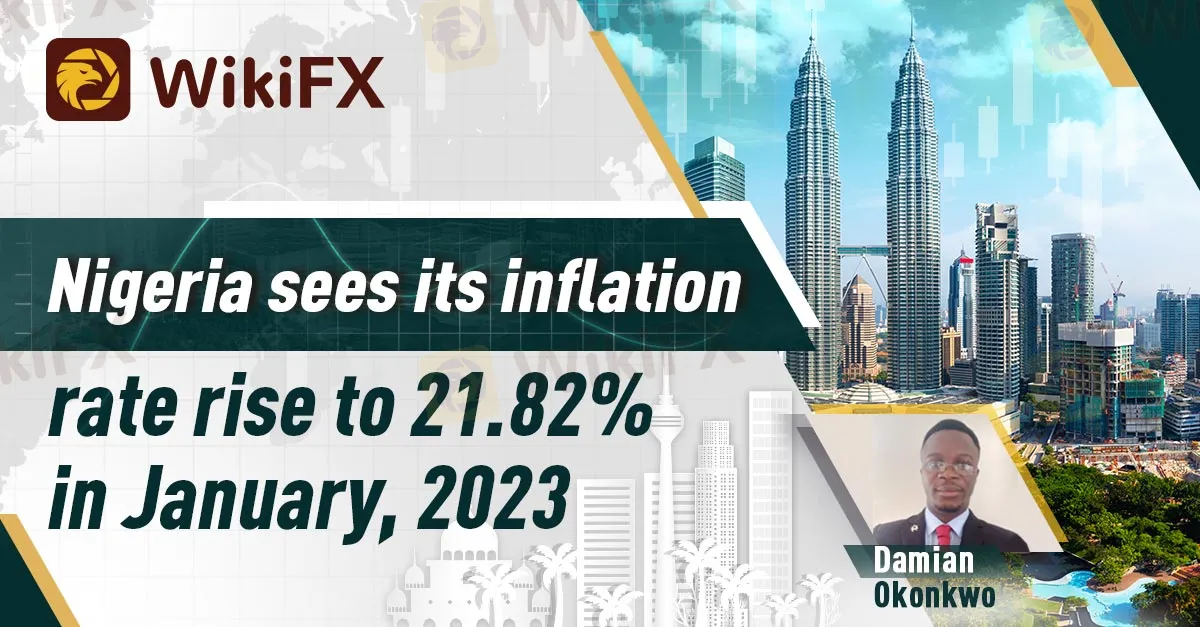简体中文
繁體中文
English
Pусский
日本語
ภาษาไทย
Tiếng Việt
Bahasa Indonesia
Español
हिन्दी
Filippiiniläinen
Français
Deutsch
Português
Türkçe
한국어
العربية
Nigeria sees its inflation rate rise to 21.82% in January, 2023
Abstract:The Nigerian inflation rate rose to 21.82% in January 2023, marking its highest level in over a decade.

By: Damian Okonkwo

Nigeria's inflation rate has surged to a new high of 21.82% in January 2023. According to the report, which was released by the National Bureau of Statistics (NBS) on Tuesday, the inflation rate in Nigeria increased by 0.99% in January 2023, compared to the 20.83% recorded in December 2022.
The current high rise in inflation is said to have been driven by the naira scarcity, which has caused prices of goods and services to skyrocket across the country.
This marks one of the highest inflation rate Nigeria has seen in over a decade, with the last time inflation was this high being in 2005 when it hit 28.2%. The latest figure shows an increase from the 20.75% recorded in December 2022.
Some economists also blamed the rise in inflation to be largely caused by the country's struggling economy and the fall in the value of the naira. Nigeria has been grappling with an economic crisis due to declining oil prices, which account for the majority of the country's revenue, and the impact of the COVID-19 pandemic.
The naira has been under pressure, with the currency losing value against the US dollar in recent months. This has led to an increase in the cost of imports, which has contributed to the rising inflation rate.
According to the NBS report, the food inflation index increased to 24.32% in January 2023 from 23.75% in December 2022. This suggests that the rising cost of food items is contributing significantly to the high inflation rate.
The report also shows that the core inflation rate, which excludes the prices of volatile agricultural produce, increased to 19.16% in January 2023 from 18.49% in December 2022.
The Nigerian government has been implementing various measures to address the country's economic challenges, including a recent decision to remove fuel subsidies and raise electricity tariffs.
However, these measures have also contributed to the rising cost of living in Nigeria, as fuel and electricity prices have increased significantly in recent months.
In response to the latest inflation figures, economists have called on the government to implement more effective policies to address the root causes of inflation, particularly naira scarcity. They have also urged the CBN to review its foreign exchange policies and take more decisive action to stabilize the currency and the economy.
Experts have further warned that the high inflation rate could have a detrimental effect on the country's economy and lead to further social unrest.
As Nigeria continues to navigate its economic challenges, it remains to be seen what measures will be taken to address the rising inflation rate and help alleviate the impact on citizens' lives.

Disclaimer:
The views in this article only represent the author's personal views, and do not constitute investment advice on this platform. This platform does not guarantee the accuracy, completeness and timeliness of the information in the article, and will not be liable for any loss caused by the use of or reliance on the information in the article.
Read more

Tradu Introduces Tax-Efficient Spread Betting for UK Traders
Tradu’s introduction of tax-efficient spread betting and groundbreaking tools like the Spread Tracker signals a new era of accessible, competitive, and innovative trading solutions for UK investors.

Trading Lessons Inspired by Squid Game
The popular series Squid Game captivated audiences worldwide with its gripping narrative of survival, desperation, and human nature. Beneath the drama lies a wealth of lessons that traders can apply to financial markets. By examining the motivations, behaviours, and strategies displayed in the series, traders can uncover valuable insights to enhance their own approach.

How Far Will the Bond Market Decline?
Recently, the yield on the U.S. 10-year Treasury bond reached a new high since April 2023, soaring to 4.7%.

Rising Risk of Japan Intervening in the Yen's Exchange Rate
The Japanese yen faces both internal and external pressures, with a potential intervention by the Japanese government looming.
WikiFX Broker
Latest News
SQUARED FINANCIAL: Your Friend or Foe?
Big News! UK 30-Year Bond Yields Soar to 25-Year High!
High-Potential Investments: Top 10 Stocks to Watch in 2025
Why Is Nvidia Making Headlines Everywhere Today?
Discover How Your Trading Personality Shapes Success
US Dollar Insights: Key FX Trends You Need to Know
FINRA Charges UBS $1.1 Million for a Decade of False Trade Confirmations
BI Apprehends Japanese Scam Leader in Manila
Bitcoin in 2025: The Opportunities and Challenges Ahead
Join the Event & Level Up Your Forex Journey
Currency Calculator






